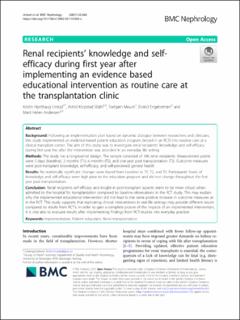| dc.contributor.author | Urstad, Kristin Hjorthaug | |
| dc.contributor.author | Andersen, Marit Helen | |
| dc.contributor.author | Engebretsen, Eivind | |
| dc.contributor.author | Wahl, Astrid Klopstad | |
| dc.date.accessioned | 2021-09-10T09:20:55Z | |
| dc.date.available | 2021-09-10T09:20:55Z | |
| dc.date.created | 2021-08-10T13:22:01Z | |
| dc.date.issued | 2021-07 | |
| dc.identifier.citation | Urstad, K.H., Wahl, A.K., Moum, T. et al. (2021) Renal recipients’ knowledge and self efficacy during first year after implementing an evidence based educational intervention as routine care at the transplantation clinic. BMC Nephrology, 22, 265 | en_US |
| dc.identifier.issn | 1471-2369 | |
| dc.identifier.uri | https://hdl.handle.net/11250/2775169 | |
| dc.description.abstract | Background
Following an implementation plan based on dynamic dialogue between researchers and clinicians, this study implemented an evidence-based patient education program (tested in an RCT) into routine care at a clinical transplant center. The aim of this study was to investigate renal recipients’ knowledge and self-efficacy during first year the after the intervention was provided in an everyday life setting.
Methods
The study has a longitudinal design. The sample consisted of 196 renal recipients. Measurement points were 5 days (baseline), 2 months (T1), 6 months (T2), and one-year post transplantation (T3). Outcome measures were post-transplant knowledge, self-efficacy, and self-perceived general health.
Results
No statistically significant changes were found from baseline to T1, T2, and T3. Participants’ levels of knowledge and self-efficacy were high prior to the education program and did not change throughout the first year post transplantation.
Conclusion
Renal recipients self-efficacy and insight in post-transplant aspects seem to be more robust when admitted to the hospital for transplantation compared to baseline observations in the RCT study. This may explain why the implemented educational intervention did not lead to the same positive increase in outcome measures as in the RCT. This study supports that replicating clinical interventions in real-life settings may provide different results compared to results from RCT’s. In order to gain a complete picture of the impacts of an implemented intervention, it is vital also to evaluate results after implementing findings from RCT-studies into everyday practice. | en_US |
| dc.language.iso | eng | en_US |
| dc.publisher | BioMed Central | en_US |
| dc.rights | Navngivelse 4.0 Internasjonal | * |
| dc.rights.uri | http://creativecommons.org/licenses/by/4.0/deed.no | * |
| dc.subject | kidney transplant | en_US |
| dc.subject | nyretransplantasjon | en_US |
| dc.title | Renal recipients’ knowledge and self efficacy during first year after implementing an evidence based educational intervention as routine care at the transplantation clinic. | en_US |
| dc.type | Peer reviewed | en_US |
| dc.type | Journal article | en_US |
| dc.description.version | publishedVersion | en_US |
| dc.rights.holder | © The Author(s). 2021 | en_US |
| dc.subject.nsi | VDP::Medisinske Fag: 700::Klinisk medisinske fag: 750::Nefrologi, urologi: 772 | en_US |
| dc.source.volume | 22 | en_US |
| dc.source.journal | BMC Nephrology | en_US |
| dc.identifier.doi | 10.1186/s12882-021-02468-x | |
| dc.identifier.cristin | 1925059 | |
| dc.source.articlenumber | 265 (2021) | en_US |
| cristin.ispublished | true | |
| cristin.fulltext | original | |
| cristin.qualitycode | 1 | |

